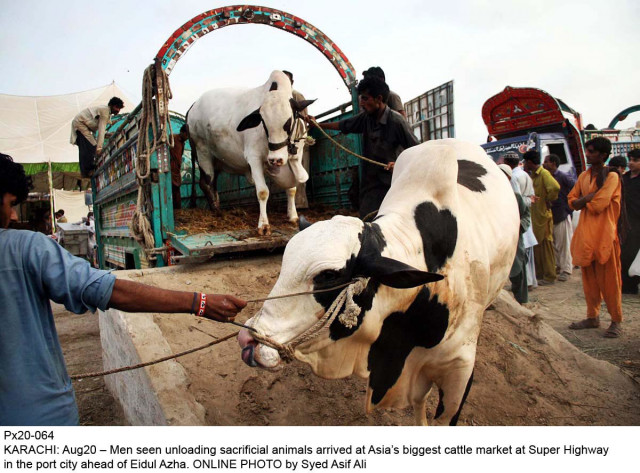Health experts sound Congo virus warning
Advise people to cover themselves, wear gloves when handling animals or their body parts

Advise people to cover themselves, wear gloves when handling animals or their body parts. PHOTO: ONLINE
They have advised citizens to be careful against sacrificial animals carrying ticks infected with the Crimean Congo Hemorrhagic Fever (CCHF) virus, noting that there was a need to create awareness among the public who were visiting animal markets, as well as those handling animal hides and carcasses.
Dr Wasim Khawaja, a public health specialist at the Pakistan Institute of Medical Sciences (Pims) in Islamabad, said that it was important to reduce the risk of tick-to-human transmission of the virus.
In this regards, he advised that people should wear protective clothing such as long sleeves or long trousers while handling animals or their meat in endemic areas, notably during the slaughtering, butchering and culling procedures at slaughterhouses or at home. Moreover, their clothing should be of a light colour so that ticks can be easily detected.
He added that people should use approved chemicals intended to kill ticks on clothes and repellents on the skin. Further, he advised that people should regularly examine their clothing and skin for ticks. If a tick is found, people should immediately remove them and avoid areas where ticks are abundant.
Dr Khawaja further advised that people should avoid close physical contact with CCHF-infected people, wear gloves and protective equipment when taking care of ill people and wash hands regularly after caring for or visiting ill people.
Dr Sharif Astori, a medical practitioner at the Federal Government Poly Clinic (FGPC) said that the virus is primarily transmitted to people from ticks and livestock.
He added human-to-human transmission can take place from close contact with the blood, secretions, organs or other bodily fluids of infected people. Moreover, ticks which carry the CCHF virus the can be found on wild and domestic animals such as cattle, sheep and goats.
He warned that apart from ticks, the virus could spread if people consume meat from animals infected with the virus since the virus can remain in the animal’s bloodstream for about a week after infection.
He added that in most of the Congo virus cases, people working with the livestock were infected including those working in the agricultural sector, slaughterhouses and veterinarians.
Dr Astori explained that after being bitten by an infected tick, the virus incubates for around three to nine days. After that symptoms such as fever, muscle ache, dizziness, neck pain and stiffness, backache, headache, sore eyes and photophobia (sensitivity to light) emerge.
He added that some may also complain of nausea, vomiting, diarrhoea, abdominal pain and sore throat early on, followed by sharp mood swings and confusion.
Published in The Express Tribune, September 1st, 2017.



1724319076-0/Untitled-design-(5)1724319076-0-208x130.webp)















COMMENTS
Comments are moderated and generally will be posted if they are on-topic and not abusive.
For more information, please see our Comments FAQ